Titanium Mesh Anode
Updated : Jul. 15, 2025Titanium mesh anode is an anode material widely used in the field of electrochemistry. It uses a pure titanium substrate and is coated with a precious metal or mixed metal oxide (MMO) layer on the surface. It has excellent conductivity, corrosion resistance and long service life. Whether in electroplating, electrolysis of water, sodium hypochlorite generator, or cathodic protection system, titanium mesh anode is an efficient, stable and economical solution.
Titanium mesh anode substrate alloy selection
The base material of titanium mesh anode is mainly industrial pure titanium, of which GR1 (Grade 1) and GR2 (Grade 2) are the most commonly used. These two materials have their own characteristics in corrosion resistance, machinability and strength, and are suitable for different application scenarios and structural design requirements.
-
Grade 1 Titanium
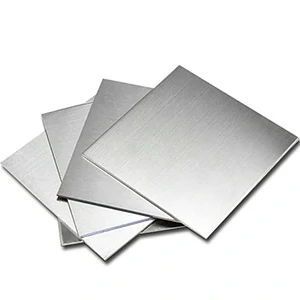
High purity (≥ 99.5%), best corrosion resistance
Soft and easy to bend, suitable for weaving, calendering and welding into mesh structures
-
Grade 2 Titanium

Higher strength than Gr1, slightly lower corrosion resistance
Good processability and weldability
Suitable for anode structures that require a certain mechanical strength
In actual selection, GR1 is more suitable for performance-oriented high-purity applications, such as electroplating or sodium hypochlorite generation systems; while GR2 is more suitable for industrial electrolysis systems with higher requirements for strength and cost balance.
Titanium mesh anode product type
-
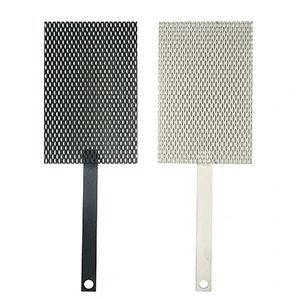
MMO titanium mesh anodeMMO titanium mesh anode is made of pure titanium mesh with a precious metal oxide coating sintered on it. It is suitable for the common 10×10 mm mesh structure, has high chlorine evolution performance and a service life of 5-15 years. It is widely used in electrolytic chlorine production, swimming pool disinfection, sodium hypochlorite generators and cathodic protection systems .
-
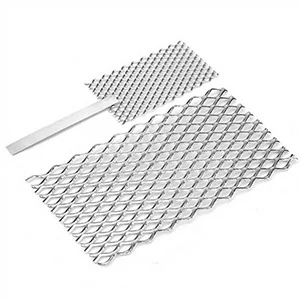
Platinum-coated titanium mesh anodeA 0.5–5 µm pure platinum layer is electroplated on the surface of Grade 1/2 titanium mesh. The hydrogen evolution overpotential is extremely low and the conductivity is excellent. It is suitable for precision electroplating, water electrolysis hydrogen production, fuel cell electrolyzers and precious metal surface treatment processes; the typical mesh size is 5 × 5 mm and the service life is more than 10 years.
-
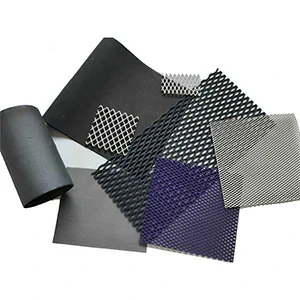
Multi-component MMO (Ru–Ir–Ta / Ir–Sn, etc.) titanium mesh anodeThe density and life of the coating are improved by using a ternary or quaternary oxide ratio, while taking into account both chlorine evolution activity and corrosion resistance. It is used for continuously operating industrial water treatment, chlor-alkali electrolysis and high-load reactors.
-
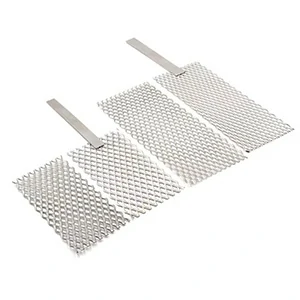
Double-sided coated titanium mesh anodeAre deposited on both sides of the mesh to ensure uniform bidirectional current distribution and reduce polarization differences. They are often used in symmetrical pole layout or rotating/flipping electrolyzers. Manufacturers offer large-scale options such as double-sided Ru–Ir or double-sided platinum coatings with a size of 1200 × 800 mm.
-
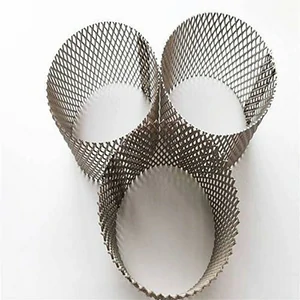
Hook /frame net anodeTitanium mesh edge welded titanium or titanium copper hooks, side channels and reinforcing ribs, convenient for hanging in the plating tank or pipeline, commonly used width 50-150 mm, length up to 1000 mm.
What are the advantages of Chalco titanium mesh anode?
Excellent corrosion resistance
Titanium mesh is stable in strong oxidizing electrolytes such as chlorides and sulfates, and a dense TiO₂ oxide film will quickly form on the surface , effectively blocking side reactions. Compared with lead anodes, the service life can reach 5-20 years , and the maintenance cycle is greatly extended.
Does not react with metals, avoids contamination
Titanium does not electrochemically dissolve with metals such as copper, nickel, and cobalt during the electrolysis process, ensuring the purity of the electrolysis product. It is particularly suitable for high-demand precision electrolysis systems.
Lightweight and high strength, easier to install
The density of titanium is only 4.5 g/cm³ , which is about 40% of that of lead, greatly reducing the burden on the equipment. The common mesh specifications are 10×5 mm , thickness 0.8–1.2 mm , wire diameter 0.3–0.5 mm , light structure, easy to install and replace.
Reduce energy consumption and improve efficiency
The operating voltage of the titanium mesh anode is reduced by an average of 0.3-0.5 V , saving about 10-15% of electricity , and the current distribution is more uniform, which can effectively reduce polarization and hot spot problems.
Clean and pollution-free, reducing maintenance
Titanium anodes do not produce lead slag or surface peeling, significantly reducing the risk of electrolyte contamination, reducing cleaning frequency, and improving the system's ability to operate continuously.
Suitable for anodizing process
Titanium mesh is lightweight, strong, and corrosion-resistant. These properties make it suitable for a variety of industries. It forms a safe oxide layer that avoids electrolytic reactions with other metals. Therefore, the use of titanium mesh can increase the production efficiency of anodized aluminum parts. Titanium mesh can withstand the impact of aluminum parts, thereby reducing downtime.
Only commercially pure titanium mesh should be used in anodizing applications because titanium combined with other metals can cause contamination.
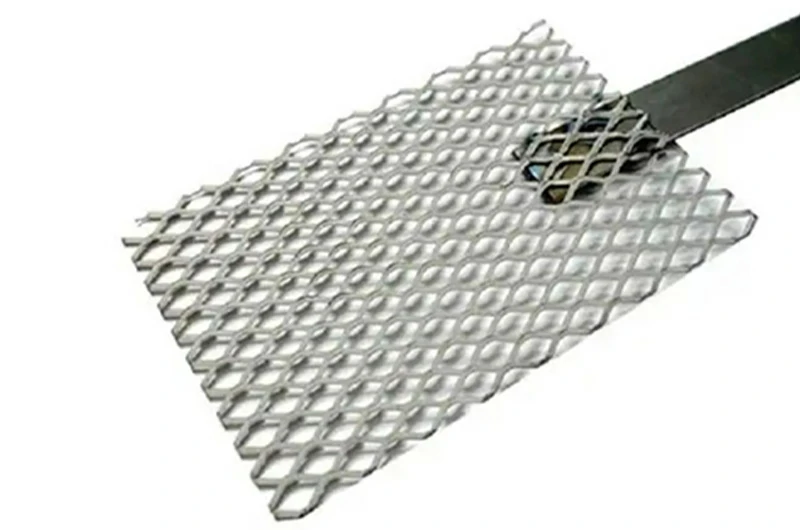
Why is titanium mesh anode an ideal replacement for lead anode?
Titanium mesh anode is a low-energy, high-efficiency anode material that can directly replace traditional cast or cold-rolled lead anodes and is suitable for new or existing electrowinning systems. Its titanium metal matrix combined with an amorphous coating structure can significantly reduce the battery voltage, and its energy-saving effect is more obvious than that of standard lead anodes or crystalline titanium anodes. It can also effectively avoid the deposition of impurities such as manganese and lead oxides.
Traditional lead anodes are prone to lead sludge during use, which not only pollutes the electrolyte, but also requires frequent manual cleaning, increasing operational risks and maintenance costs. Titanium anodes do not require lead sludge cleaning, effectively reducing safety risks for operators and improving the cleanliness and stability of the system.
Another advantage of titanium anodes is that there is no need to add cobalt sulfate to the electrolyte for anode stabilization. This not only simplifies the process flow, but also further reduces operating costs. Since titanium anodes do not require electrical isolation devices, the availability and overall production capacity of the electrolyzer are also improved.
FAQ
What is the service life of titanium mesh anode?
Typically 5–20 years, depending on coating type (eg, Ru-Ir, Ir-Ta), usage environment, current density, and maintenance.
Which electrolytic processes are titanium mesh anodes suitable for?
It is widely used in electrolysis, electroplating, water electrolysis, sodium hypochlorite generator, cathodic protection and anodized aluminum processes of non-ferrous metals such as copper, nickel and cobalt.
What common specifications are available?
Common mesh sizes are 10×5 mm, 6×12 mm, thickness 0.8–1.2 mm, wire diameter 0.3–0.5 mm. Sizes and structures can be customized as needed.
What is the difference between MMO coating and platinum coating?
MMO coating is suitable for chlorine evolution and highly corrosive environments, has a long service life and low cost; platinum coating is more conductive and suitable for high-precision electroplating, but is more expensive.
Can titanium anodes completely replace lead anodes?
Yes. Titanium mesh anodes are better in corrosion resistance, environmental protection and power efficiency. The operating voltage can be reduced by 0.3-0.5V, saving energy by 10-15%.
Are custom structures supported?
It supports customized hooks, welding frames, special-shaped sizes, double-sided coatings, etc., and is suitable for different electrolytic cells and installation methods.




